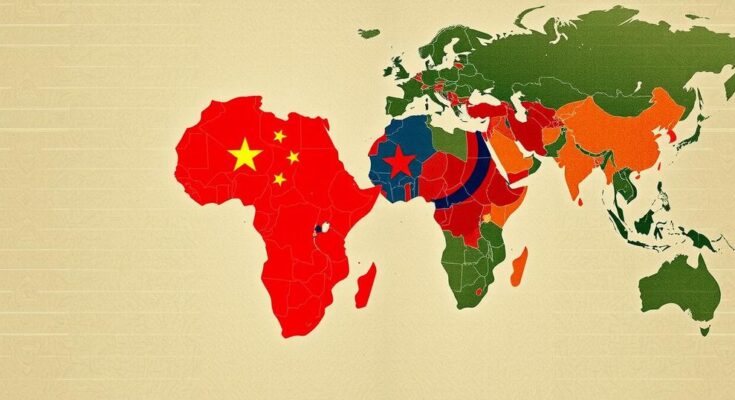Chinese Foreign Minister Wang Yi pledged military aid amounting to one billion yuan ($136 million) for Africa during his tour, which included discussions with Nigerian leaders. He emphasized supporting African nations in resolving their issues independently and announced plans to train 6,000 troops and 1,000 police officers. China’s growing influence in Africa is characterized by heightened trade relations and strategic partnerships amidst shifting geopolitical rivalries.
On January 6, Chinese Foreign Minister Wang Yi concluded a tour across Africa by affirming China’s unwavering support and commitment to military aid for the continent. He made his final stop in Nigeria where he engaged with President Bola Ahmed Tinubu and Foreign Minister Yusuf Tuggar. Wang declared a pledge of one billion yuan (approximately $136 million) specifically for military assistance, alongside vows to train 6,000 troops and 1,000 police officers from various African nations. He emphasized China’s role in empowering Africans to address their issues independently, stating that “African people are the real masters of this continent.”
In light of increasing geopolitical tensions, particularly following a series of military coups in West Africa, China is keen on establishing stronger ties. Many former French colonies are gravitating towards China seeking partnerships in contrast to their historical ties with France. As the leading business partner for Africa, China’s trade hit $167.8 billion in the first quarter of 2024, showcasing its significant influence on the continent’s economy. This influence is underscored by China’s ongoing investments in infrastructure and support for construction projects.
The commitment to military aid is framed against a backdrop of China’s strategic interests in securing access to Africa’s extensive mineral resources and fortifying relationships to counterbalance United States’ influence globally. Following a recent meeting between Chinese President Xi Jinping and numerous African leaders where a pledge of $50 billion in aid was made over three years, analysts suggest that China’s approach may be recalibrating in response to domestic economic pressures and mounting international rivalries.
Consequently, the landscape of international relations in Africa is evolving, marked by a pivot towards nations like China, Russia, and Turkey, as influential players navigate a realm traditionally dominated by former colonial powers. This shift is indicative of a changing paradigm which may potentially redefine the future of geopolitical relations on the continent.
The dynamics of international relations in Africa have experienced significant shifts in recent years, particularly as countries transition away from traditional powers such as France. The frequency of military coups in West Africa has positioned nations like China, Russia, and Turkey as new allies for former colonies seeking alternatives to Western influence. China’s proactive stance, rooted in trade and military assistance, aims to bolster their strategic interests while promoting a narrative of collective African self-determination. China’s economic footprint in Africa, illustrated by burgeoning trade agreements and construction projects, reflects a deepening symbiotic relationship marked by vast resource access and infrastructure development. These efforts, however, have raised concerns over debt sustainability for many African nations, creating a complex backdrop for future collaboration. Simultaneously, China is navigating growing competition with the United States, which adds a layer of geopolitical rivalry to its engagement approach. As this landscape evolves, understanding the implications of China’s intensified military and economic contributions becomes crucial in shaping Africa’s development trajectory.
In conclusion, China’s commitment to providing military aid and training to African countries represents a strategic initiative aimed at enhancing its influence on the continent amid a shifting geopolitical landscape. The $136 million military pledge, combined with ongoing economic partnerships, underscores a growing reliance on China’s support as African nations seek to navigate their distinct challenges and foster regional cooperation. This evolving dynamic, marked by a departure from historical ties with colonial powers, positions China as a critical player in Africa’s future development and security.
Original Source: www.france24.com




